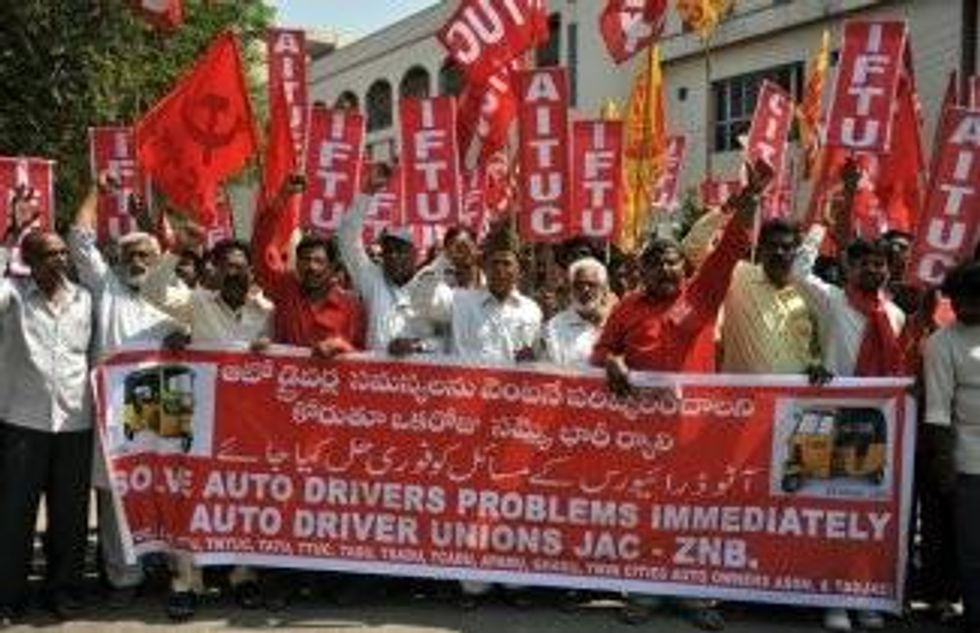Millions of people, including members of the nation's eleven largest trade unions, took to the streets across India today in a nationwide strike that seeks a remedy to rampant inflation, an end to the privatization of public entities, and increased labor protections -- including calls for a social security system and a minimum wage. The strikes were mostly aimed at the financial institutions, the postal service, and the transportation sector.
Agence France-Presse reports:
A nationwide strike called by trade unions including those affiliated with the government hit Indian cities Tuesday, as millions joined the call for tighter labour laws and a minimum wage.
Eleven central trade unions backed the strike call, posing a fresh challenge to Prime Minister Manmohan Singh and his leftist administration, which had called on the unions to call off the show of force.
"We are fighting for our rights against a government that is anti-people." --Gurudas Dasgupta
"This is a historic occasion. For the first time all the big trade unions have come together to protest the anti-labour polices of the government," All India Trade Union Congress general secretary Gurudas Dasgupta told AFP.
Among the unions' demands are a national minimum wage, permanent jobs for 50 million contract labourers, more government efforts to rein in the rising cost of living, and an end to the sale of stakes in profitable public companies.
"We gave the government ample opportunity to discuss these issues. Now striking is the only option before us," Dasgupta said.
"We are fighting for our rights against a government that is anti-people," he added.
The Indian Express adds:
Life in major cities, including capital Delhi, Mumbai and Chennai, was normal though it was affected in states like Kerala, Odisha and Tripura while the strike had a mixed response in West Bengal where the Trinamool Congress government pulled all stops to neutralise the strike.
In West Bengal, shops, markets and business establishments were mostly closed in some areas, while state-run buses and trams plied with fewer passengers. [...]
Central trade unions have sponsored the strike demanding guarantee of labour rights, end to the contract labour system, bringing workers in the unorganised sector under the social security net and pension benefit for all workers.
And The Hindustan Times reports:
The strike, which includes workers from state-run phone companies, bus drivers and postal workers, is a new headache for Prime Minister Manmohan Singh's government as it grapples with weakening economic growth and faces elections in several states.
Workers linked to the ruling Congress party have also joined the protest and have promised further action if their demands are not met. [...]
"We will have to think about our future course of action if the government does not come forward with proposals on how it will react to our demands," G. Sanjeeva Reddy, president of the Indian National Trade Union Congress, the ruling party's trade union, said.
Hit by high interest rates, stubborn inflation and a stuttering reform agenda, India's economy is expected to grow by about 7% in the fiscal year ending March, compared with earlier expectations of about 9% growth.
Singh's government has faced a slew of protests since winning a second term in 2009, denting the Congress party's image as a defender of the poor.
The party is currently fighting five state elections, including one in Uttar Pradesh, the country's most populous state.
###




